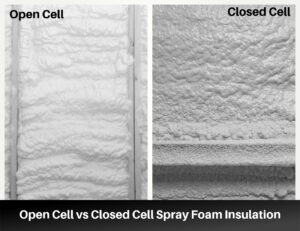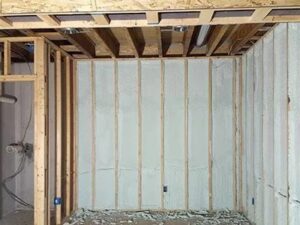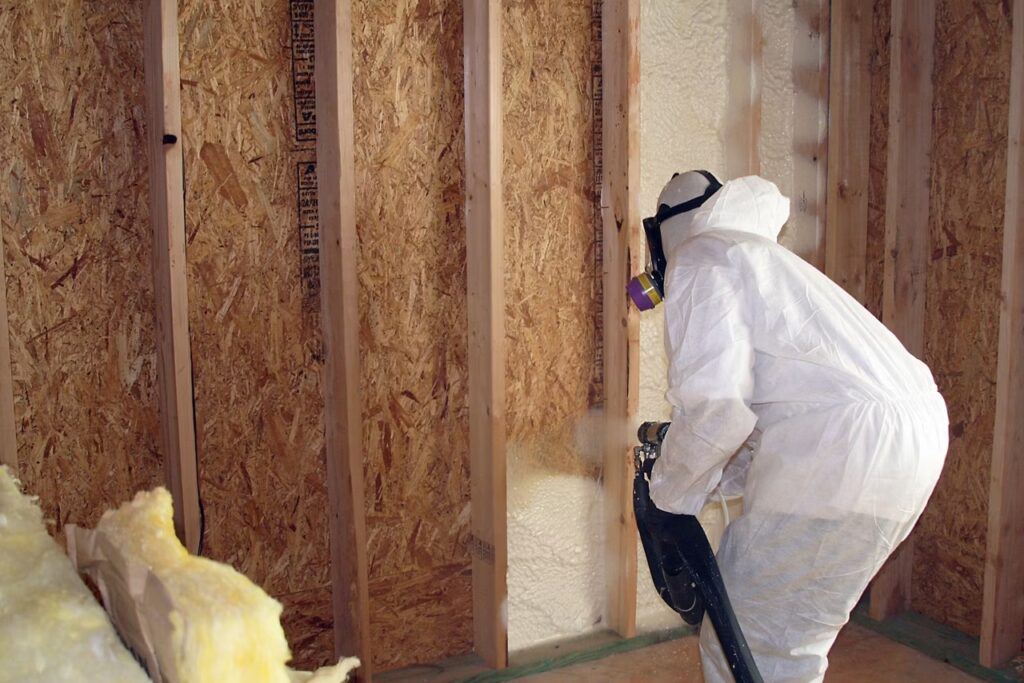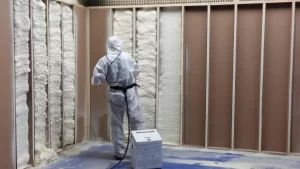Spray foam insulation offers significant benefits for homeowners looking to reduce energy costs and improve indoor comfort over the long term. By providing superior thermal insulation and air sealing, premium spray foam can be an excellent investment. This article explores the advantages, types, and key factors to consider before choosing spray foam insulation for your home.
Key Benefits of Premium Spray Foam Insulation
Premium spray foam insulation creates a seamless barrier that insulates homes more effectively than traditional materials like fiberglass or cellulose. It has the ability to expand upon application, filling gaps and cracks that would otherwise let air and moisture seep into your home. This results in better energy efficiency, lower utility bills, and a more comfortable living environment.
Here’s a quick overview of the long-term savings and benefits spray foam insulation provides:
- Improved Energy Efficiency: Spray foam offers a high R-value (thermal resistance), which keeps heat in during the winter and out during the summer.
- Air and Moisture Barrier: It helps reduce drafts and controls humidity, preventing mold and mildew growth.
- Durability: Unlike traditional insulation, spray foam does not sag or settle over time.
- Soundproofing: The material helps reduce noise pollution, providing a quieter environment.
Types of Spray Foam Insulation
There are two primary types of spray foam insulation: open-cell and closed-cell. Each type has unique characteristics that make it suitable for specific applications. The choice depends on your needs, budget, and the specific conditions of your home.

Open cell vs closed cell insulation spray foam
Open-Cell Spray Foam
Open-cell spray foam is softer and more flexible, making it ideal for interior applications. It is less expensive and provides excellent soundproofing, but it has a lower R-value compared to closed-cell foam.
Closed-Cell Spray Foam
Closed-cell spray foam is denser and more rigid, offering a higher R-value and making it suitable for both interior and exterior applications. It is also more resistant to moisture, making it perfect for areas exposed to humidity or water.
| Feature | Open-Cell Spray Foam | Closed-Cell Spray Foam |
| R-Value per inch | 3.5-4.0 | 6.0-7.0 |
| Density | 0.5 lb/ft³ | 2.0 lb/ft³ |
| Water Resistance | Low | High |
| Soundproofing | Excellent | Moderate |
| Cost | Lower | Higher |
| Best For | Interior walls, attics, ceilings | Basements, crawl spaces, exterior walls |
Things to Consider Before Making a Decision
Before investing in premium spray foam insulation, there are several important factors to weigh:
1. Upfront Cost vs. Long-Term Savings
While spray foam insulation tends to be more expensive upfront compared to other options, the long-term energy savings often make it a cost-effective choice. Depending on your climate and energy usage, you can expect to recoup the initial investment within 3-7 years.
2. Climate
Spray foam is especially effective in regions with extreme weather conditions—both hot and cold. It’s perfect for homes in areas with high humidity or regions that experience significant temperature fluctuations.
3. Installation Process
Installing spray foam insulation requires professional expertise. The material must be sprayed evenly to ensure optimal performance, and the process can take several hours to a day, depending on the size of the area being insulated. Be prepared for some disruption during installation.
4. Environmental Impact
Spray foam insulation is generally not as eco-friendly as cellulose or fiberglass because it involves chemicals during production. However, some spray foams are now available with low environmental impact, so it’s important to check the product’s sustainability ratings.

Premium Spray Foam Insulation
Technical Specifications of Spray Foam Insulation
Here’s a detailed breakdown of key technical specifications for open-cell and closed-cell spray foam insulation:
| Specification | Open-Cell Spray Foam | Closed-Cell Spray Foam |
| R-Value per Inch | 3.5 – 4.0 | 6.0 – 7.0 |
| Density (lb/ft³) | 0.5 – 1.0 | 2.0 – 2.5 |
| Compressive Strength (psi) | 3 – 5 | 15 – 25 |
| Air Barrier Performance | High | Very High |
| Vapor Permeability | High (more moisture permeable) | Low (resists moisture) |
| Life Expectancy | 20-30 years | 40+ years |
Common Questions
How long does spray foam insulation last?
Spray foam insulation typically lasts for 20-30 years, depending on the type and quality. Closed-cell foam can last even longer, up to 40+ years, due to its higher density and resistance to moisture.
Is spray foam insulation safe?
When installed correctly by professionals, spray foam insulation is safe. However, improper application or inadequate ventilation during installation can release chemicals. Make sure the installation is done by certified professionals who adhere to safety standards.
Can spray foam insulation be removed or replaced?
Yes, spray foam can be removed if necessary, though the process can be labor-intensive. If you decide to replace it, a professional contractor will need to ensure that all foam is fully removed before applying new insulation.
Does spray foam insulation have any environmental drawbacks?
While spray foam insulation is effective, its environmental impact can be significant due to the chemicals used. Some manufacturers offer eco-friendly versions with low global warming potential (GWP), which help mitigate this issue.
Bonus Tips
- Get Multiple Quotes: Installation costs can vary significantly, so get quotes from several contractors to ensure competitive pricing.
- Check for Rebates: Some regions offer rebates for installing energy-efficient insulation, so be sure to check your local programs before making a purchase.
- Proper Ventilation is Key: Even though spray foam is excellent for sealing, ensure that your home is properly ventilated to prevent moisture buildup that could cause damage over time.
Make the Right Decision
When considering spray foam insulation for long-term savings, it’s important to evaluate the upfront cost, installation process, and long-term benefits. Choosing the right professional spray foam insulation for your home, factoring in the climate, and ensuring proper installation will ultimately lead to greater comfort and energy efficiency for years to come.
FAQ
What is the difference between open-cell and closed-cell spray foam?
Open-cell spray foam is softer, has a lower R-value, and is more affordable.Premium Closed-cell spray foam insulation is denser, has a higher R-value, and provides better resistance to water and air.
Can spray foam insulation be used in basements?
Yes, closed-cell spray foam is ideal for basements due to its moisture resistance and higher R-value.
Is spray foam insulation suitable for all climates?
Spray foam insulation works well in both hot and cold climates, but its effectiveness is especially noticeable in areas with significant temperature extremes or high humidity.
Does spray foam insulation help with noise reduction?
Yes, open-cell spray foam provides excellent soundproofing by filling gaps and reducing sound transmission between rooms.






